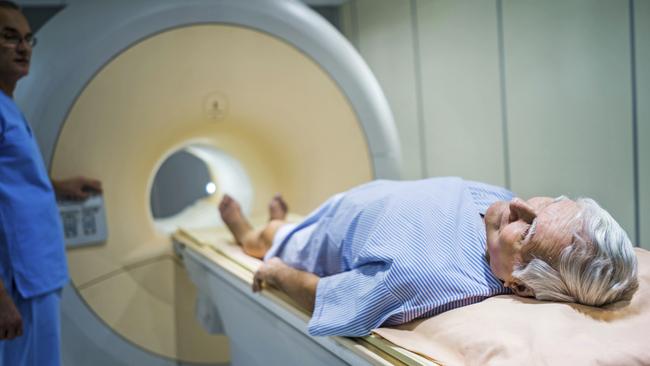GPs’ ‘outdated’ prostate cancer screening guide under review
Urologists have raised the alarm that aggressive prostate cancer cases were routinely missed as many GPs follow ‘outdated’ advice that recommends against screening of asymptomatic men.

A guideline that GPs are under “no obligation” to refer men for prostate cancer testing is under review after urologists raised the alarm that aggressive cases were being routinely missed because many primary care doctors were following “outdated” advice that did not recommend screening of asymptomatic men.
The Royal Australian College of General Practitioners was prompted to review the evidence it relied on to decline recommending routine PSA testing to asymptomatic men after The Weekend Australian questioned why its advice conflicted with national guidelines that advise testing those with a family history and men aged 50-70.
“Screening of asymptomatic (low-risk) men for prostate cancer by prostate-specific antigen (PSA) testing is not recommended because the benefits have not clearly been shown to outweigh the harms,” the RACGP guidance says. “This remains the case following recent large trials. Therefore, GPs have no obligation to offer prostate cancer screening to asymptomatic men.”
The RACGP guidelines specifies that the onus is on the individual to request prostate cancer screening. “Some men may have individual concerns about prostate cancer and may put a higher value on the possible benefits of prostate cancer screening,” the Red Book states. “This requires specific discussion to address the benefits and harms (from overdiagnosis and overtreatment) of prostate cancer screening.
“If after an informed process, perhaps using a decision aid, a man still requests prostate cancer screening, a PSA blood test is acceptable.”
The number of men dying of prostate cancer rose by almost 15 per cent between 2016 and 2022 from 3,052 per year to 3,507. Age-standardised mortality from the disease decreased slightly. “The Royal Australian College of GPs is currently reviewing the Red Book and will be updating its guidelines about … PSA testing, which aligns with the 2016 National Health and Medical Research Council and Prostate Cancer Foundation of Australia’s guidelines,” a spokesperson said.
The RACGP supplies doctors with material that indicates few lives are likely to be saved from yearly PSA screening of men aged 55-69.
But urological surgeon Peter Heathcote said it was “perplexing and difficult to understand” why many GPs continued to follow guidance against testing when European research had demonstrated the clear benefits.
“The literature on the efficacy of screening has matured significantly and is showing undoubtedly that PSA screening saves lives,” Dr Heathcote said. “I saw a fellow last week who is 50 with metastatic cancer, 50 for goodness sake. He had a family history of prostate cancer. His GP hadn’t advised screening. It’s heartbreaking to see that. It’s just a terrible cancer. I’m frustrated, disappointed, shattered when I see a young man or a man who’s lost an opportunity for cure.”
The GP guidelines were rooted in concerns about the overdetection and overtreatment of prostate cancer, but this no longer generally occurs because of the routine use of MRI in diagnosis and a widespread non-invasive approach of “active surveillance” of cancers.

The RACGP has now acknowledged this shift. “Men aged 50-69 at average risk of prostate cancer should be informed about the benefits and harms of PSA testing to allow them to make an informed decision,” a spokesperson said. “The Red Book committee is aware of changes in urological practice, which have reduced some of the potential harms.”
Around 24,000 Australian men are diagnosed with prostate cancer – the most common form in the country – every year. Around 3500 die from it. The number of men diagnosed is expected to increase by 43 per cent from more than 240,000 today to 372,000 by 2040.
NSW police officer Justin Falkner’s father had prostate cancer, which doubled his chances of developing the disease. But when he asked his GP a few years ago to refer him for a PSA test when he was 42, he was told it wasn’t necessary. “I was told not to worry about it as I wasn’t 50,” he said. Two years later he had a PSA test that led to a diagnosis of prostate cancer. Mr Falkner wants to encourage men to obtain testing amid research that shows 70 per cent do not know the symptoms of prostate cancer and 75 per cent are not familiar with the guidelines.
The Prostate Cancer Foundation of Australia said too many men have a similar experience.
“One of the most common complaints that we get from men … is that their GP either refused a PSA test or advised the man that he didn’t need it,” said PCFA CEO Anne Savage. “The evidence we do have right now tells us enough to know that that recommendation is wrong and needs to be changed.”








To join the conversation, please log in. Don't have an account? Register
Join the conversation, you are commenting as Logout